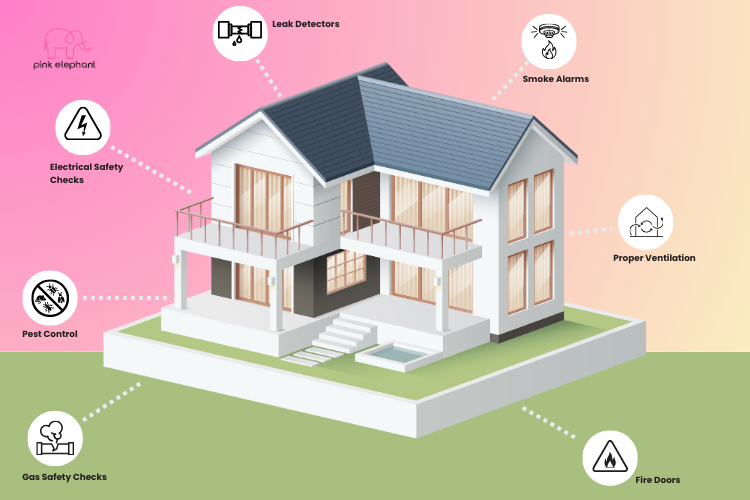Tips for Landlords: How to Make Properties Safe for Tenants

When it comes to renting a space, you can’t just hand over the keys and hope for the best. As a landlord, looking after your tenants’ and property safety and comfort helps create a space they want to call home. And when a home feels safe, it builds trust. Trust leads to longer tenancies, fewer surprises, and far fewer late-night “something’s broken” calls.
So, let’s explore some essential property safety tips and guidelines to help you keep your rentals safe, compliant, and welcoming.

Understand Your Legal Responsibilities
First and foremost, it’s crucial to be aware of your legal obligations as a landlord in the UK. Ensuring compliance not only protects your tenants but also safeguards you from potential legal issues.
Here are a few key checks you should already have in place:
- Gas Safety: Annual checks by certified engineers are mandatory, with certificates provided to tenants within 28 days.
- Electrical Safety: Since 2021, Electrical Installation Condition Reports (EICRs) have been required every five years.
- Fire Safety: Install smoke alarms on each floor and carbon monoxide detectors in rooms with solid fuel appliances.
Not sure if you’re ticking all the right boxes? We’ve broken it all down in our ‘What Are the Legal Requirements for Landlords?’
Go Beyond Compliance
While meeting legal standards is essential, going the extra mile can set your property apart and provide added peace of mind for your tenants. Think about enhancements like:
- Smart Technology: Consider installing smart smoke alarms, leak detectors, and security systems. These not only enhance safety but also appeal to tech-savvy tenants.
- Quality Materials: Use durable, low-risk materials in your property to prevent accidents and reduce maintenance costs.
- Ventilation: Ensure proper ventilation to prevent mould growth and maintain air quality, promoting a healthier living environment.
For more on property safety tips, check out our blog, ‘Property Maintenance Tips and Best Practices for Landlords’—it’s packed with practical advice to help you stay ahead of wear and tear before it becomes costly.
Foster a Culture of Safety
Creating a safe environment goes beyond the physical aspects of the property; it’s also about building trust and open lines of communication with your tenants. After all, a tenant who feels heard is far more likely to flag issues before they become real problems. Here are a few ways to foster that safety-first relationship:
- Clear Communication: Provide tenants with clear instructions on emergency procedures and contact information for maintenance issues.
- Regular Check-Ins: Schedule periodic check-ins to address any concerns and reinforce the importance of property safety.
- Feedback Mechanisms: Encourage tenants to report potential hazards or suggest improvements.
Implement Routine Property Safety Checks
Regular inspections are key to maintaining a safe property. Create a schedule for monthly, quarterly, and annual checks to ensure all property safety measures are functioning correctly. Your schedule should look something like this:
- Monthly: Test smoke and carbon monoxide alarms.
- Quarterly: Inspect fire extinguishers, emergency lighting, and exit routes.
- Annually: Conduct comprehensive safety audits, including gas and electrical systems.
Our team at Pink Elephant can manage these inspections for you, providing detailed reports and recommendations.
Special Considerations for HMOs
If you manage a House in Multiple Occupation (HMO), additional safety regulations apply. These include:
- Fire Doors: Install fire-resistant doors with self-closing mechanisms.
- Escape Routes: Ensure clear, unobstructed escape routes with appropriate signage.
- Shared Spaces: Maintain cleanliness and safety in communal areas.
Partner with Pink Elephant for Peace of Mind
Ensuring the safety of your tenants is a continuous process that requires diligence, knowledge, and proactive management. At Pink Elephant, we offer comprehensive property management services designed to keep your properties safe, compliant, and desirable to tenants so you don’t have to.
Ready to elevate your property management experience? Contact us today to learn how we can help you provide the safest homes for your tenants.
For more insights and tips, explore our blog section.
FAQs
What property safety checks should a landlord do?
Landlords should perform regular checks, including:
- Gas Safety: Annual checks by certified engineers.
- Electrical Safety: EICR every 5 years.
- Fire Safety: Install smoke and carbon monoxide alarms.
Additionally, test alarms monthly and inspect fire extinguishers quarterly.
What are a landlord’s security responsibilities?
Landlords must ensure their property is secure, including:
- Secure locks on doors and windows.
- Adequate exterior lighting.
- Preventing security hazards like broken gates or fences.
What property safety certificates do landlords need?
Key safety certificates for landlords include:
- Gas Safety Certificate: Annual checks by a Gas Safe engineer.
- Electrical Safety Certificate: EICR every 5 years.
- Energy Performance Certificate (EPC): Must be provided to tenants.
Smoke and Carbon Monoxide Alarms: Install and maintain
